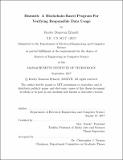| dc.contributor.advisor | Alex "Sandy" Pentland. | en_US |
| dc.contributor.author | Erhardt, Keeley Donovan | en_US |
| dc.contributor.other | Massachusetts Institute of Technology. Department of Electrical Engineering and Computer Science. | en_US |
| dc.date.accessioned | 2018-12-13T14:40:21Z | |
| dc.date.available | 2018-12-13T14:40:21Z | |
| dc.date.copyright | 2017 | en_US |
| dc.date.issued | 2017 | en_US |
| dc.identifier.uri | http://hdl.handle.net/1721.1/119629 | |
| dc.description | Thesis: M. Eng., Massachusetts Institute of Technology, Department of Electrical Engineering and Computer Science, 2017. | en_US |
| dc.description | This electronic version was submitted by the student author. The certified thesis is available in the Institute Archives and Special Collections. | en_US |
| dc.description | Cataloged from student-submitted PDF version of thesis. | en_US |
| dc.description | Includes bibliographical references (pages 74-75). | en_US |
| dc.description.abstract | The amount of digital information generated, collected and stored is growing at a staggering rate. Data-driven insights are increasingly relied upon to make decisions, directly impacting individuals. The burgeoning importance of data in shaping the world around us requires a shift in the current data ownership, exchange and usage paradigm. Responsible data use should be verifiably free from leaking sensitive information, discriminatory usage, illegal applications, and other misuse. Additionally, a standard of correctness for computations executed against datasets should be enforced. Enlisting trusted parties to vet the code being executed against sensitive data can reduce the prevalence of irresponsible or malevolent data usage. Trusted parties can attest to attributes of the code-for example, that the code is privacy-preserving, or that it is legal to execute against data collected from users in a certain country, or that a computation reliably and correctly computes an answer as advertised-to ensure that individuals' personal information is used appropriately. This thesis presents an illustration of a design to structure, vet and verify the code that is executed against sensitive data, along with a proposal for using blockchain-based smart con- tracts to audit and enforce proper usage of vetted code to promote a paradigm of "safe" question-and-answer exchange. Finally, this thesis demonstrates Bismuth, a blockchain-based program built to implement the ideas presented in this work and to assist in a transition towards more thoughtful and responsible data usage. | en_US |
| dc.description.statementofresponsibility | by Keeley Donovan Erhardt. | en_US |
| dc.format.extent | 75 pages | en_US |
| dc.language.iso | eng | en_US |
| dc.publisher | Massachusetts Institute of Technology | en_US |
| dc.rights | MIT theses are protected by copyright. They may be viewed, downloaded, or printed from this source but further reproduction or distribution in any format is prohibited without written permission. | en_US |
| dc.rights.uri | http://dspace.mit.edu/handle/1721.1/7582 | en_US |
| dc.subject | Electrical Engineering and Computer Science. | en_US |
| dc.title | Bismuth : a blockchain-based program for verifying responsible data usage | en_US |
| dc.title.alternative | Blockchain-based program for verifying responsible data usage | en_US |
| dc.type | Thesis | en_US |
| dc.description.degree | M. Eng. | en_US |
| dc.contributor.department | Massachusetts Institute of Technology. Department of Electrical Engineering and Computer Science | |
| dc.identifier.oclc | 1066694003 | en_US |
